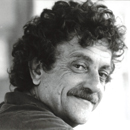
Kurt Vonnegut
Literary giant for more than 50 years, author of Slaughterhouse-Five and many other classics
This legendary American author says: "When my brother, Bernard, began to do very well as a chemist, I was given more or less a direct order to become a chemist, too. So I kept away from the arts, which were made to seem silly and weak, and studied chemistry for three years at Cornell University. I was delighted to catch pneumonia during my third year and, upon recovery, to forget everything I ever learned about chemistry and go to war."
"I was a battalion scout and was easily captured. The most interesting thing I saw during the war, I suppose, was the destruction of Dresden, the largest single massacre in European history. I was a prisoner of war in a meat locker under a slaughterhouse when the worst of the firestorm was going on."
"After the war... I went to the University of Chicago, where they allowed me to be a graduate student in anthropology, even though I had no degree. I stayed there for three years, also working as a police reporter for the Chicago City News Bureau. I went broke and hired out as a flack for the research laboratory of the General Electric Company where my brother was doing remarkable work with respect to cloud physics. I hated it there, but curiously made the closest friends I've ever had. At the end of my third year I began to sell short stories to Collier's and the Saturday Evening Post as well as other magazines that were then very fat. I made what seemed like a lot of money so I began a novel that mocked General Electric, quit my job, threw a party that was stopped by the police, and moved to Cape Cod."
Since that time (1951), Mr. Vonnegut's career has encompassed a variety of similarly varied experiences. His freelance writing has been interspersed with activities such as "serving as the1st SAAB dealer in the U. S. on Cape Cod" and "acting as the entire English department in a school for disturbed children." He was a lecturer at the University of Iowa Writer's Workshop from 1965-67; lecturer in English at Harvard University in 1970 and Distinguished Professor at the City College of New York from 1973-1974. A member of the National Institute of Arts and Letters, he was the recipient of their literary award in 1970. In 1971, he received an MA in Anthropology from the University of Chicago. Vonnegut currently resides in New York City.
Slaughterhouse Five, which became a best seller and was made into a film, made Vonnegut a literary celebrity. Several of his novels are now required reading in colleges and universities, including Cat's Cradle, The Sirens of Titan, and Breakfast of Champions.
Timequake, which the publisher calls Vonnegut's first full-length work of fiction in seven years, was published in 1997. His most recent book, A Man Without A Country (2005), currently #5 on the New York Times Bestseller List, is based on short essays and speeches composed over the last five years. This work gives us Vonnegut both speaking out with indignation and writing tenderly to his fellow Americans, sometimes joking, at other times outraged, and always searching.
Vonnegut worries "some about why I write books when presidents and generals do not read them." He concludes that the trick is to catch them at school, "before they become generals and senators and poison their minds with humanity."
Special thanks to our Lifetime Patrons





 View All Sponsors ›
View All Sponsors ›

Sign-up here to receive email updates from The Connecticut Forum!
We will send you exciting updates about our season, panelist announcements, special events, news and information that will keep you "in the know."
Your personal information is safe with us. We will never sell or share your personal information with anyone else.
